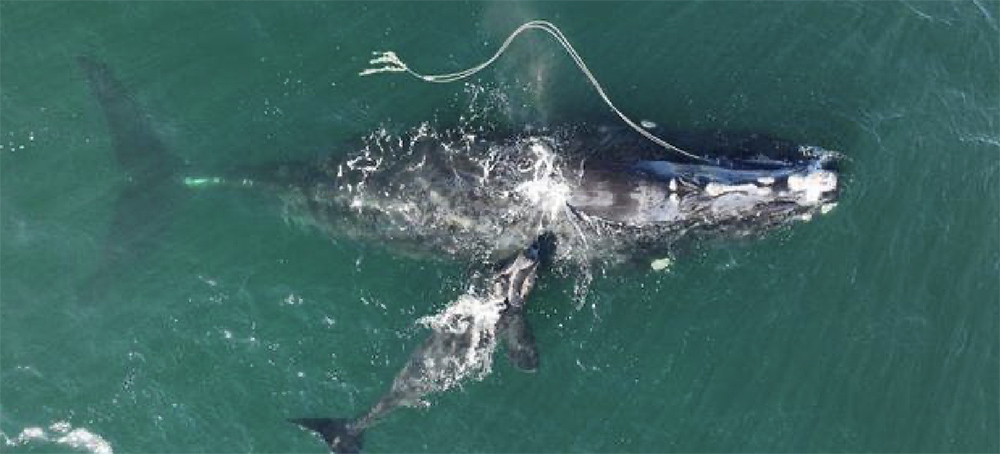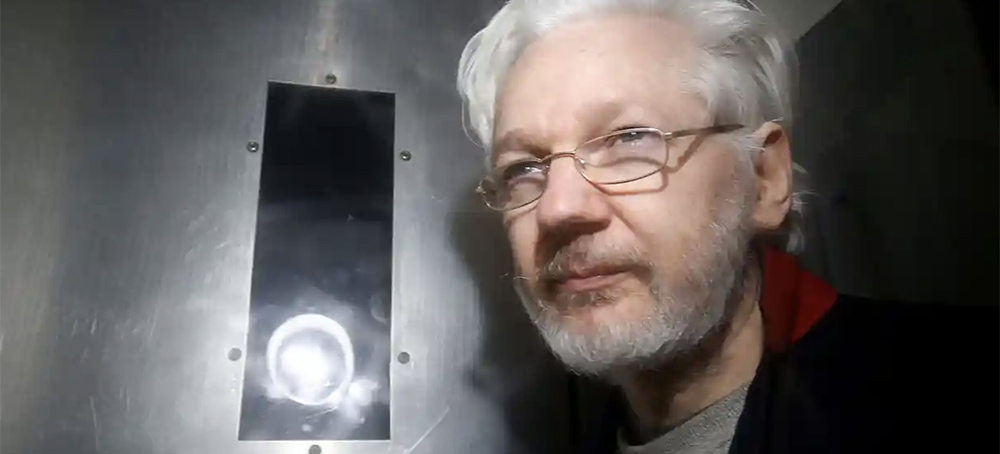Is “Surviving December” the New Normal?
Increasingly December is becoming a fundraising nightmare. Traditionally December was always considered a month where we would get a year-end boost. It’s not only no longer that, it’s rapidly becoming the worst month of the year.
No traction at all on donations. Big concern.
Marc Ash
Founder, Reader Supported News
If you would prefer to send a check:
Reader Supported News
PO Box 2043 / Citrus Heights, CA 95611
Follow us on facebook and twitter!
Live on the homepage now!
Reader Supported News
The appeals process could take another two years, and during that period, Assange will continue to be stranded in London’s Belmarsh Prison, a cold, dank penitentiary on the outskirts of the city. For all intents and purposes, Assange already has been held in some form of incarceration since 2009, whether it has been house arrest, holed up in the Ecuadorean Embassy in London, or at Belmarsh. The prospects were he to be extradited to the US are no better.
The Justice Department has charged Assange with multiple counts of espionage for his work with Chelsea Manning in exposing US war crimes in Iraq. If extradited, he will not have an easy time of things in the Eastern District of Virginia. Judge Leonie Brinkema, a Reagan appointee, has long reserved national security cases for herself. She was the judge in my case and in CIA whistleblower Jeffrey Sterling’s case, and she is the named judge in what would be an espionage case against Edward Snowden. And although Brinkema was initially named as the judge in the Assange trial, she was later scooped by a more senior judge with an even more troubling past. Judge Claude Hilton, the district’s senior judge, is another Reagan appointee who was also named by former Supreme Court Chief Justice William Rehnquist as a member of the notorious Foreign Intelligence Surveillance (FISA) Court, where he served from 2000-2007. Hilton is a hawk on national security issues, and Assange will have no friend in his court if the extradition takes place.
I’ve noted in the past that Assange will be subject to CIPA, the Classified Information Protection Act, that will prohibit him and his attorneys from raising myriad issues and from appropriately defending him against the government’s accusations. CIA attorneys will be in court every day to “protect Agency equities;” that is, to insist that the judge bar Assange and his attorneys from raising the notion that what Wikilkeaks did by publishing evidence of war crimes was whistleblowing. They also argue that Assange is neither a publisher nor a journalist. The fix is in. There’s no such thing as a fair trial in a national security case, especially in the Eastern District of Virginia, the home of the CIA and the Pentagon.
Even more importantly, in my mind, is the assertion by US prosecutors to the UK appeals court that Assange would not be sent to a maximum-security penitentiary, to solitary confinement, or to a Communications Management Unit. The promise is utterly disingenuous. It is not within the purview of Justice Department prosecutors to decide where a prisoner is incarcerated. That determination is made solely by the Bureau of Prisons, the largest (and arguably most corrupt) bureau within the Department. When I was sentenced after blowing the whistle on the CIA’s torture program, Judge Brinkema, after telling me that she wished she could give me the maximum sentence of 10 years (I received 30 months) ordered that I be sent to a minimum-security work camp. I was sent to a low-security prison instead. When Judge Liam O’Grady sentenced drone whistleblower Daniel Hale to 45 months, he ordered that Hale be sent to the low-security prison hospital at Butner, NC so that he could receive treatment for Post Traumatic Stress Disorder. Instead, Hale was sent to the maximum-security penitentiary (and the Communications Management Unit) at Marion, Illinois. The bottom line here is that judges don’t get to say where a prisoner goes. Neither do prosecutors. It’s up to the Bureau of Prisons. And if they want to screw somebody, especially a high-profile prisoner like Julian Assange, they’ll screw him.
Julian’s extradition to the United States is not imminent. The case will now go to the British Supreme Court. Regardless of who wins there, it’ll likely end up at the European Court of Human Rights. That could take another two years. But in the meantime, don’t believe a single word that the Justice Department says. They’re liars. And they’ll do literally anything to win a national security case, especially against Julian Assange.
John Kiriakou is a former CIA counterterrorism officer and a former senior investigator with the Senate Foreign Relations Committee. John became the sixth whistleblower indicted by the Obama administration under the Espionage Act - a law designed to punish spies. He served 23 months in prison as a result of his attempts to oppose the Bush administration's torture program.
Reader Supported News is the Publication of Origin for this work. Permission to republish is freely granted with credit and a link back to Reader Supported News.
 Mark Meadows. (photo: Yuri Gripas/Bloomberg/Getty Images)
Mark Meadows. (photo: Yuri Gripas/Bloomberg/Getty Images)
It was just one of several new details in the report about Meadows' actions before and during January 6, as well as his role in attempting to overturn the 2020 election. The resolution comes after the panel informed Meadows last week that it had "no choice" but to advance criminal contempt proceedings against him given that he had decided to no longer cooperate.
The committee notes that in one email Meadows sent to an individual about January 6, he said that "the National Guard would be present to 'protect pro Trump people' and that many more would be available on standby," according to the report. The new documents come as Meadows' role is under renewed scrutiny following his decision to cease cooperating with the committee last week.
Committee chairman Bennie Thompson appeared to allude to this January 5 email about having the National Guard on standby in a letter to Meadows' attorney last week informing him that the panel would move forward with contempt proceedings.
Thompson also referred to a November 7, 2020, email discussing the appointment of alternate slates of electors as part of a "direct and collateral attack" and a January 5 email that had a 38-page PowerPoint briefing titled "Election Fraud, Foreign Interference & Options for 6 JAN" to be provided "on the hill."
Meadows, according to the report, "received text messages and emails regarding apparent efforts to encourage Republican legislators in certain States to send alternate slates of electors to Congress, a plan which one Member of Congress acknowledged was 'highly controversial' and to which Mr. Meadows responded, 'I love it.'"
"Mr. Meadows responded to a similar message by saying '[w]e are' and another such message by saying 'Yes. Have a team on it,'" the report said.
Additionally, the committee notes that Meadows "exchanged text messages with, and provided guidance to, an organizer of the January 6th rally on the Ellipse after the organizer told him that '[t]hings have gotten crazy and I desperately need some direction.'"
If Meadows was still cooperating, the committee also said it would inquire about a text exchange with a media personality "who had encouraged the presidential statement asking people to, quote, 'peacefully leave the Capitol,'" as well as a text sent "to one of— by one of the President's family members indicating that Mr. Meadows is, quote, 'pushing hard,' end quote, for a statement from President Trump to, quote, 'condemn this shit,' end quote, happening at the Capitol."
The committee has previously sought communications between Meadows and certain rally organizers as the panel remains focused on identifying any level of coordination with the Trump White House. The report goes on to note that Meadows was directly involved in efforts to overturn the election results in key swing states Trump lost and helped push unfounded claims about voter fraud.
"Mr. Meadows participated in meetings and calls during which the participants reportedly discussed the need to ''fight'' back against ''mounting evidence'' of purported voter fraud after courts had considered and overwhelmingly rejected Trump campaign claims of voter fraud and other election irregularities," it says.
"He participated in one such meeting in the Oval Office with Mr. Trump and Members of Congress, which he publicly tweeted about from his personal Twitter account shortly after. He participated in another such call just days before the January 6 attack with Mr. Trump, Members of Congress, attorneys for the Trump re-election campaign, and 'some 300' State and local officials to discuss the goal of overturning certain States' electoral college results on January 6, 2021," the report adds.
In response to the panel's push for criminal contempt proceedings, Meadows filed a lawsuit against House Speaker Nancy Pelosi and select committee members, asking a federal court to block enforcement of the subpoena the committee issued him as well as the subpoena it issued to Verizon for his phone records.
Meadows alleges that the subpoenas are "overly broad and unduly burdensome," while claiming that the committee "lacks lawful authority to seek and to obtain" the information requested.
Still, prior to Meadows' decision to halt cooperation with the committee, he had turned over approximately 6,000 pages worth of documents. That includes information from his personal email account and personal cell phone that are relevant to the committee's investigation.
 Gen. Stephen J. Townsend, center, lowered the level of authority to approve strikes to on-scene commanders, increasing the number of strikes. (photo: Mosa'ab Elshamy/AP)
Gen. Stephen J. Townsend, center, lowered the level of authority to approve strikes to on-scene commanders, increasing the number of strikes. (photo: Mosa'ab Elshamy/AP)
An American strike cell alarmed its partners as it raced to defeat the enemy.
The unit was called Talon Anvil, and it worked in three shifts around the clock between 2014 and 2019, pinpointing targets for the United States’ formidable air power to hit: convoys, car bombs, command centers and squads of enemy fighters.
But people who worked with the strike cell say in the rush to destroy enemies, it circumvented rules imposed to protect noncombatants, and alarmed its partners in the military and the C.I.A. by killing people who had no role in the conflict: farmers trying to harvest, children in the street, families fleeing fighting, and villagers sheltering in buildings.
 Sen. Patrick Leahy (D-Vt.), the former longtime chair of the Senate Judiciary Committee, says it's time to let Leonard Peltier go home. (photo: Kevin Dietsch/Getty Images)
Sen. Patrick Leahy (D-Vt.), the former longtime chair of the Senate Judiciary Committee, says it's time to let Leonard Peltier go home. (photo: Kevin Dietsch/Getty Images)
The former Judiciary Committee chairman and longest-serving U.S. senator says it's time for the Native American activist to go home after 44 years.
Without hesitation, Leahy, who is currently chair of the Appropriations Committee, answered yes to all of HuffPost’s questions about Peltier.
Do you know who Peltier is? “Yes.”
The Native American activist who’s been in prison? For decades? “Yes.”
Is it time for him to be released? “Yes.”
It appears to be the first time Leahy has urged freedom for Peltier, making him the highest-ranked official in the U.S. government calling for his release. Leahy, who has announced he’s retiring from the Senate, is third in the line of succession to the presidency, just after Vice President Kamala Harris and House Speaker Nancy Pelosi (D-Calif.).
Peltier has been in prison for 44 years for a crime he says he didn’t commit. His trial was riddled with misconduct. Prosecutors hid key evidence. The FBI threatened and coerced witnesses into lying. A juror admitted she was biased against Peltier’s race on the second day of the trial but was allowed to stay on anyway.
There was never proof that he killed two FBI agents in a 1975 shootout on Pine Ridge Reservation in South Dakota. But the FBI needed someone to take the fall. It had just lost two agents, and Peltier’s co-defendants were all acquitted on grounds of self-defense. His trial was also happening as the FBI was trying to suppress the activities of the American Indian Movement (AIM), a grassroots group of activists focused on drawing attention to federal treaty rights violations, discrimination and police brutality targeting Native Americans.
Peltier, an AIM member, was there when the shootout occurred on June 26, 1975. So the U.S. Attorney’s Office charged him with murder based entirely on testimony from people who had been threatened and intimidated by the FBI, some of whom later recanted their testimony.
By all appearances, the FBI is simply waiting for Peltier to die in prison.
Peltier is 77 now and ailing in a Florida penitentiary. He is perhaps America’s longest-serving political prisoner. His story still moves hundreds of thousands of people to sign petitions urging his release. An astounding mix of human rights leaders have called for his release, including Pope Francis, the Dalai Lama, Mother Teresa, Nelson Mandela and Coretta Scott King. Prominent artists including Willie Nelson, Bonnie Raitt and Rage Against the Machine have held concerts in his name. Elected tribal leaders and the National Congress of American Indians have passed resolutions urging clemency.
Even the U.S. attorney who helped put Peltier in prison wrote to President Joe Biden this summer urging him to grant clemency.
“I write today from a position rare for a former prosecutor: to beseech you to commute the sentence of a man who I helped put behind bars,” former U.S. Attorney James Reynolds said to Biden in a July letter. “With time, and the benefit of hindsight, I have realized that the prosecution and continued incarceration of Mr. Peltier was and is unjust. We were not able to prove that Mr. Peltier personally committed any offense on the Pine Ridge Reservation.”
With Biden in the White House, Peltier’s supporters say they feel a renewed sense of hope that Peltier may have a shot at living out his final years as a free man.
A White House spokesperson did not immediately respond to a request for comment on whether Biden is considering clemency for Peltier.
 Rep. Devin Nunes (R-CA) at the Capitol on March 6, 2019, in Washington, DC. (photo: Chip Somodevilla/Getty Images)
Rep. Devin Nunes (R-CA) at the Capitol on March 6, 2019, in Washington, DC. (photo: Chip Somodevilla/Getty Images)
Congressman poised to helm Trump’s media company is poster child for the notion that, in today’s politics, extreme partisanship pays
When news broke on Monday that Nunes was retiring from Congress to become chief executive of the fledgling Trump Media & Technology Group, nobody on the left or the right doubted he’d landed where he belonged. After 19 years as a reliably rock-ribbed Republican legislator, Nunes told his supporters that he wasn’t giving up on fighting his political enemies, just “pursuing it by other means” – and for once those enemies took him at his word.
Even Kevin McCarthy, the top-ranking Republican in the House of Representatives and a fellow Californian, failed to raise any hackles when he said in a statement that nobody was better prepared than Nunes to lead an alternative to America’s tech and media giants. Nunes, after all, has spent years filing lawsuits against Twitter, the Washington Post, and a clutch of other media companies that he, and Trump, consider to be part of a “propaganda machine” for the Democrats.
In many ways, Nunes is embracing the role his detractors have long accused him of playing, as Trump’s ultimate yes man. Early in the Trump presidency, leading Democrats fumed that he was walking away from his grave responsibilities as chair of the House intelligence committee to be Trump’s “stooge” and “fixer”. Now, though, he is walking away from Congress to serve Trump, without pretending that anything else is at stake.
Both sides also broadly agree that Nunes’s surprise career move is a sign of the times. A generation ago, no politician of either party would have given up on the prospect of chairing the House ways and means committee, a job that would have been Nunes’s for the taking if the Republicans were to win next year’s congressional midterms. The position is often described as the best in Washington, because of the sweeping power it grants over a wide range of policy issues.
Nunes, however, appears to have calculated that in today’s Republican party the real power lies not in committee but in proximity to the former president, who remains the GOP’s undisputed kingmaker and may harbor ambitions to be more than that as the 2024 presidential election draws closer.
Nunes went out his way, while intelligence committee chair, to clear Trump of accusations of collusion with Russia during the 2016 presidential campaign and promptly turned around to investigate the FBI’s reasons for looking into the matter in the first place. Trump rewarded him with a presidential Medal of Freedom, praising his “fortitude to take on the media, the FBI, the intelligence community, the Democrat party, foreign spies, and the full power of the Deep State”.
Nunes, 48, is in many ways a poster child for the notion that, in today’s politics, extreme partisanship pays. While his unwavering allegiance to Trump and frequent spouting of freewheeling conspiracy theories caused his popularity in the agricultural district he represents in California’s Central Valley to nosedive – his margin of victory plummeted from 35 percentage points in 2016 to single digits in 2018 and 2020 – his Trump bona fides have made him a formidable fundraiser.
Ahead of last year’s congressional race, he raised a whopping $26.8m, the fourth-largest haul of any House member, and he used much of that money to outspend his spirited Democratic challenger, Phil Arballo, by a margin of four to one.
Like the man he is going to work for, Nunes has made a career out of divisiveness. He slams the Democrats as socialists and also as the party of the capitalist elite and doesn’t blink at the contradiction. A sampling of recent media appearances, many of them on his own podcast, has him accusing China of being “behind” the Covid-19 pandemic, lambasting the National Security Agency for mounting what he claims to be a political witch hunt against Republicans, and belittling Joe Biden and Kamala Harris as mere “avatars” for Barack Obama.
Some of that divisiveness, and the chaos that often erupts in its wake, is likely to greet him as he starts his new job. Two financial regulatory agencies are already investigating a $1.25bn business deal to take the Trump Media & Technology Group public. Nunes and Trump are spoiling for fights with Twitter, which banned the former president from its site in the wake of the 6 January Capitol riot, and a number of other social media platforms they accuse of censoring free speech.
That accusation is not without irony for Nunes, who has attempted to silence two detractors on Twitter with the spoof handles @DevinNunesCow and @DevinNunesMom. In a widely ridiculed 2019 lawsuit, he demanded $250m in damages from Twitter and the people behind the handles because, he said, they’d meant to cause him “immense pain”.
In California’s 22nd congressional district, the news of Nunes’ departure caused little detectable dismay among his supporters and was greeted by his detractors with both relief and frustration (relief because they say that he has long since placed his political ambitions above the interests of his constituents, frustration because local Democrats believed they had a decent shot at unseating him next year).
Nunes, his 2020 challenger Arballo tweeted, “is fleeing from Congress at the end of the month because he would rather cash out and take a cushy gig from Trump than face our movement in a tough reelection campaign.”
With California, and the rest of the country, redrawing district maps in the wake of the latest US census, Nunes was heading into a significantly tougher electoral environment. According to the latest provisional map, the 22nd would flip from one that voted to reelect Trump by five percentage points last year to one that voted for Biden by nine points.
Nunes had some options if he’d chosen to fight for reelection, since California law does not oblige candidates for office to live in their districts. He could have challenged a Republican incumbent in an adjacent district or contested an open seat further away.
Instead, Nunes has responded to the siren call of a man who once flattered him into thinking he “may someday be recognized as a Great American Hero”. Trump’s business ventures have rarely ended happily for those he has roped into helping run them, but his political fortunes have yet to run dry.
 A volunteer empties a ballot box in a voting station of Noumea, New Caledonia. (photo: Mathurin Derel/AP)
A volunteer empties a ballot box in a voting station of Noumea, New Caledonia. (photo: Mathurin Derel/AP)
With 90 percent of ballots counted, 96 percent of voters had voted ‘No’ to independence, local media reports.
Police reinforcements have been sent to the territory known as “the pebble”, which is of strategic importance to France and is part of a wider tussle for influence in the Pacific between Western countries and China.
Local television channel NC la 1ere reported that, with 90.23 percent of ballots counted, 96.32 percent of voters had voted “No” to independence in a result that will raise fears of unrest and questions about the legitimacy of the process.
French President Emmanuel Macron said that New Caledonia will remain French.
“Caledonians have chosen to remain French. They decided that freely,” Macron said in a televised address.
“We can’t ignore that the electorate remained deeply divided over the years … A period of transition is now starting,” he added.
The archipelago of about 185,000 voters, 2,000 kilometres (1,250 miles) east of Australia, was granted three independence referendums under a 1988 deal aimed at easing tensions on the islands.
Turnout on Sunday was only 41.60 percent by 5 pm local time (0600 GMT).
Having rejected a breakaway from France in 2018 and then again last year, the inhabitants were asked one last time: “Do you want New Caledonia to accede to full sovereignty and become independent?”
Pro-independence campaigners boycotted the vote, saying they wanted it postponed to September because “a fair campaign” was impossible with high coronavirus infection numbers.
The result could exacerbate ethnic tensions, with the poorer indigenous Kanak community generally favouring independence over the wealthier white community.
The main indigenous pro-independence movement, the Kanak Socialist National Liberation Front (FLNKS), had called the government’s insistence on going ahead with the referendum “a declaration of war”.
“This referendum does not make too much sense because half the population has decided not to vote,” Cathy, a bookseller who gave only her first name, told AFP news agency at a polling booth in the capital Noumea.
“I came out of civic-mindedness, what interests me is the society we are going to build afterwards,” she told AFP.
Jacques Reland, senior research fellow at the Global Policy Institute told Al Jazeera he believes the vote will be challenged by those who seek independence.
“The result is striking – 96.5 percent were against independence but the turnout was only 44 percent. In the two previous referendums, the turnout was above 80 percent and the vote against independence had fallen from 56 percent to 53 percent in 2020,” Reland said.
“The big question is, will [the independence movement] accept this result? What will their strategy be now because the French government considers it as a clear vote against independence and that New Caledonia will remain France.
“Some people voted with their heart, but many with their head. The COVID-19 crisis, the sanitary crisis has shown the importance of having the backing of the French government which helped New Caledonia with vaccines as well as all the social and economic measures to boost the economy during this health crisis,” Reland said.
One of five island territories spanning the Indo-Pacific held by France, New Caledonia is the centrepiece of Macron’s plan to increase its influence in the Pacific.
 Snow Cone, with fishing rope dragging from her mouth, and her newborn calf on Dec. 2. (photo: Georgia Department of Natural Resources/NOAA Permit #20556)
Snow Cone, with fishing rope dragging from her mouth, and her newborn calf on Dec. 2. (photo: Georgia Department of Natural Resources/NOAA Permit #20556)
The mother whale, nicknamed Snow Cone, was first seen dragging fishing rope behind her in Massachusett’s Plymouth Bay in March, according to a Friday release from the National Oceanic and Atmospheric Administration. Rescuers were able to get some, but not all, of the rope off of her before she left the bay.
More attempts were made to free her in May and June, but Snow Cone resisted their efforts and was “evasive and strong,” Mackie Greene of the New Brunswick-based Campobello Whale Rescue team told CBC News.
No one knew at the time that Snow Cone was pregnant. But earlier this month, scientists spotted Snow Cone ― still dragging thick, heavy rope from her mouth ― with a newborn calf off the coast of Georgia.
NOAA scientists were both “surprised and concerned” that Snow Cone had managed to give birth while entangled, the agency’s statement said.
The calf is healthy, uninjured and not caught in the rope, but scientists fear the baby could get entangled, too.
“My concern is [Snow Cone’s] still got two pieces of rope, about 20 feet, coming out from the left side of her mouth,” Clay George, a biologist with the Georgia Department of Natural Resources biologist told the Associated Press. “If those two pieces of rope ended up getting knotted around each other and there’s a loop, you could imagine that calf could end up becoming entangled.”
Even if that doesn’t happen, the stress of the situation still poses a major threat to both the calf and Snow Cone’s health.
“Entanglement alone is a costly energetic drain and so is nursing a calf,” Barb Zoodsma, a large whale recovery coordinator at NOAA, said in the release. “The severity of her mouth and head injuries are also disconcerting. For these reasons, Snow Cone may be facing her biggest challenge yet in the upcoming months.”
She noted, however that Snow Cone’s perseverance ― her previous calf was killed in a boat collision last year ― shows that the mother whale “clearly” has “game.”
In the meantime, scientists say that, while her newborn is close by, it’s too risky to get close to Snow Cone to try again to disentangle her.
North Atlantic right whales are critically endangered, and both fishing gear entanglements and collisions with ships are major threats to the species. According to NOAA, there are fewer than 350 of the whales left, and they’re currently dying out faster than they can reproduce.
Follow us on facebook and twitter!
PO Box 2043 / Citrus Heights, CA 95611



